- Home
- Pearl S. Buck
The Big Wave Page 2
The Big Wave Read online
Page 2
“Will they come?” Kino asked.
“Not all of them,” his father replied. “Parents will try to make their children go, but the children will not want to leave their parents. Mothers will not want to leave fathers, and the fathers will stay by their boats. But some will want to be sure of life.”
The bell kept on ringing urgently, and soon out of the village a trickling stream of people, nearly all of them children, began to climb toward the knoll.
“I wish Jiya would come,” Kino said. “Do you think he will see me if I stand on the edge of the terrace and wave my white girdle cloth?”
“Try it,” his father said.
“Come with me,” Kino begged.
So Kino and his father stood on the edge of the terrace and waved. Kino took off the strip of white cloth from about his waist that he wore instead of a belt, and he waved it, holding it in both hands, high above his head.
Far down the hill Jiya saw the two figures and the waving strip of white against the dark sky. He was crying as he climbed, and trying not to cry. He had not wanted to leave his father, but because he was the youngest one, his older brother and his father and mother had all told him that he must go up the mountain. “We must divide ourselves,” Jiya’s father said. “If the ocean yields to the fires you must live after us.”
“I don’t want to live alone,” Jiya said.
“It is your duty to obey me, as a good Japanese son,” his father told him.
Jiya had run out of the house, crying. Now when he saw Kino, he decided that he would go there instead of to the castle, and he began to hurry up the hill to the farm. Next to his own family he loved Kino’s strong father and kind mother. He had no sister of his own and he thought Setsu was the prettiest girl he had ever seen.
Kino’s father put out his hand to help Jiya up the stone wall and Kino was just about to shout out his welcome when suddenly a hurricane wind broke out of the ocean. Kino and Jiya clung together and wrapped their arms about the father’s waist.
“Look—look—what is that?” Kino screamed.
The purple rim of the ocean seemed to lift and rise against the clouds. A silver-green band of bright sky appeared like a low dawn above the sea.
“May the gods save us,” Kino heard his father mutter. The castle bell began to toll again, deep and pleading. Ah, but would the people hear it in the roaring wind? Their houses had no windows toward the sea. Did they know what was about to happen?
Under the deep waters of the ocean, miles down under the cold, the earth had yielded at last to the fire. It groaned and split open and the cold water fell into the middle of the boiling rocks. Steam burst out and lifted the ocean high into the sky in a big wave. It rushed toward the shore, green and solid, frothing into white at its edges. It rose, higher and higher, lifting up hands and claws.
“I must tell my father!” Jiya screamed.
But Kino’s father held him fast with both arms. “It is too late,” he said sternly.
And he would not let Jiya go.
In a few seconds, before their eyes the wave had grown and come nearer and nearer, higher and higher. The air was filled with its roar and shout. It rushed over the flat still waters of the ocean and before Jiya could scream again it reached the village and covered it fathoms deep in swirling wild water, green laced with fierce white foam. The wave ran up the mountainside, until the knoll where the castle stood was an island. All who were still climbing the path were swept away—black, tossing scraps in the wicked waters. The wave ran up the mountain until Kino and Jiya saw the wavelets curl at the terrace walls upon which they stood. Then with a great sucking sigh, the wave swept back again, ebbing into the ocean, dragging everything with it, trees and stones and houses. They stood, the man and the two boys, utterly silent, clinging together, facing the wave as it went away. It swept back over the village and returned slowly again to the ocean, subsiding, sinking into a great stillness.
Upon the beach where the village stood not a house remained, no wreckage of wood or fallen stone wall, no little street of shops, no docks, not a single boat. The beach was as clean of houses as if no human beings had ever lived there. All that had been was now no more.
Jiya gave a wild cry and Kino felt him slip to the ground. He was unconscious. What he had seen was too much for him. What he knew, he could not bear. His family and his home were gone.
Kino began to cry and Kino’s father did not stop him. He stooped and gathered Jiya into his arms and carried him into the house, and Kino’s mother ran out of the kitchen and put down a mattress and Kino’s father laid Jiya upon it.
“It is better that he is unconscious,” he said gently. “Let him remain so until his own will wakes him. I will sit by him.”
“I will rub his hands and feet,” Kino’s mother said sadly.
Kino could say nothing. He was still crying and his father let him cry for a while. Then he said to his wife:
“Heat a little rice soup for Kino and put some ginger in it. He feels cold.”
Now Kino did not know until his father spoke that he did feel cold. He was shivering and he could not stop crying. Setsu came in. She had not seen the big wave, for her mother had closed the windows and drawn the curtains against the sea. But now she saw Jiya lying white-pale and still.
“Is Jiya dead?” she asked.
“No, Jiya is living,” her father replied.
“Why doesn’t he open his eyes?” she asked again.
“Soon he will open his eyes,” the father replied.
“If Jiya is not dead, why does Kino cry?” Setsu asked.
“You are asking too many questions,” her father told her. “Go back to the kitchen and help your mother.”
So Setsu went back again, sucking her forefinger, and staring at Jiya and Kino as she went, and soon the mother came in with the hot rice soup and Kino drank it. He felt warm now and he could stop crying. But he was still frightened and sad.
“What will we say to Jiya when he wakes?” he asked his father.
“We will not talk,” his father replied. “We will give him warm food and let him rest. We will help him to feel he still has a home.”
“Here?” Kino asked.
“Yes,” his father replied. “I have always wanted another son, and Jiya will be that son. As soon as he knows that this is his home, then we must help him to understand what has happened.”
Chapter Two
SO THEY WAITED for Jiya to wake.
“I don’t think Jiya can ever be happy again,” Kino said sorrowfully.
“Yes, he will be happy someday,” his father said, “for life is always stronger than death. Jiya will feel when he wakes that he can never be happy again. He will cry and cry and we must let him cry. But he cannot always cry. After a few days he will stop crying all the time. He will cry only part of the time. He will sit sad and quiet. We must allow him to be sad and we must not make him speak. But we will do our work and live as always we do. Then one day he will be hungry and he will eat something that our mother cooks, something special, and he will begin to feel better. He will not cry any more in the daytime but only at night. We must let him cry at night. But all the time his body will be renewing itself. His blood flowing in his veins, his growing bones, his mind beginning to think again, will make him live.”
“He cannot forget his father and mother and his brother!” Kino exclaimed.
“He cannot and he should not forget them,” Kino’s father said. “Just as he lived with them alive, he will live with them dead. Someday he will accept their death as part of his life. He will weep no more. He will carry them in his memory and his thoughts. His flesh and blood are part of them. So long as he is alive, they, too, will live in him. The big wave came, but it went away. The sun shines again, birds sing, and earth flowers. Look out over the sea now!”
Kino looked out the open door, and he saw the ocean sparkling and smooth. The sky was blue again, a few clouds on the horizon were the only sign of what had passed—except for
the empty beach.
“How cruel it seems for the sky to be so clear and the ocean so calm!” Kino said.
But his father shook his head. “No, it is wonderful that after the storm the ocean grows calm, and the sky is blue once more. It was not the ocean or the sky that made the evil storm.”
“Who made it?” Kino asked. He let tears roll down his cheeks, because there was so much he could not understand. But only his father saw them and his father understood.
“Ah, no one knows who makes evil storms,” his father replied. “We only know that they come. When they come we must live through them as bravely as we can, and after they are gone, we must feel again how wonderful is life. Every day of life is more valuable now than it was before the storm.”
“But Jiya’s family—his father and mother and brother, and all the other good fisherfolk, who are lost—” Kino whispered. He could not forget the dead.
“Now we must think of Jiya,” his father reminded him. “He will open his eyes at any minute and we must be there, you to be his brother, and I to be his father. Call your mother, too, and little Setsu.”
Now they heard something. Jiya’s eyes were still closed, but he was sobbing in his sleep. Kino ran to fetch his mother and Setsu and they gathered about his bed, kneeling on the floor so as to be near Jiya when he opened his eyes.
In a few minutes, while they all watched, Jiya’s eyelids fluttered on his pale cheeks, and then he opened his eyes. He did not know where he was. He looked from one face to the other, as though they were strangers. Then he looked up into the beams of the ceiling and around the white walls of the room. He looked at the blue-flowered quilt that covered him.
None of them said anything. They continued to kneel about him, waiting. But Setsu could not keep quiet. She clapped her hands and laughed. “Oh, Jiya has come back!” she cried. “Jiya, did you have a good dream?”
The sound of her voice made him fully awake. “My father—my mother—” he whispered.
Kino’s mother took his hand. “I will be your mother now, dear Jiya,” she said.
“I will be your father,” Kino’s father said.
“I am your brother now, Jiya,” Kino faltered.
“Oh, Jiya will live with us,” Setsu said joyfully.
Then Jiya understood. He got up from the bed and walked to the door that stood open to the sky and the sea. He looked down the hillside to the beach where the fishing village had stood. There was only beach, and all that remained of the twenty and more houses were a few foundation posts and some big stones. The gentle little waves of the ocean were playfully carrying the light timber that had made the houses, and throwing it on the sands and snatching it away again.
The family had followed Jiya and now they stood about him. Kino did not know what to say, for his heart ached for his friend-brother. Kino’s mother was wiping her eyes, and even little Setsu looked sad. She took Jiya’s hand and stroked it.
“Jiya, I will give you my pet duck,” she said.
But Jiya could not speak. He kept on looking at the ocean.
“Jiya, your rice broth is growing cold,” Kino’s father said.
“We ought all to eat something,” Kino’s mother said. “I have a fine chicken for dinner.”
“I’m hungry!” Setsu cried.
“Come, my son,” Kino’s father said to Jiya.
They persuaded him gently, gathering around him, and they entered the house again. In the pleasant cosy room they all sat down about the table.
Jiya sat with the others. He was awake, he could hear the voices of Kino’s family, and he knew that Kino sat beside him. But inside he still felt asleep. He was very tired, so tired that he did not want to speak. He knew that he would never see his father and mother any more, or his brother, or the neighbors and friends of the village. He tried not to think about them or to imagine their quiet bodies, floating under the swelling waves.
“Eat, Jiya,” Kino whispered. “The chicken is good.”
Jiya’s bowl was before him, untouched. He was not hungry. But when Kino begged him he took up his porcelain spoon and drank a little of the soup. It was hot and good, and he smelled its fragrance in his nostrils. He drank more and then he took up his chopsticks and ate some of the meat and rice. His mind was still unable to think, but his body was young and strong and glad of the food.
When they had all finished, Kino said, “Shall we go up the hillside, Jiya?”
But Jiya shook his head. “I want to go to sleep again,” he said.
Kino’s father understood. “Sleep is good for you,” he said. And he led Jiya to his bed, and when Jiya had laid himself down he covered him with the quilt and shut the sliding panels.
“Jiya is not ready yet to live,” he told Kino. “We must wait.”
Chapter Three
THE BODY BEGAN to heal first, and Kino’s father, watching Jiya tenderly, knew that the body would heal the mind and the soul. “Life is stronger than death,” he told Kino again and again.
But each day Jiya was still tired. He did not want to think or to remember—he only wanted to sleep. He woke to eat and then to sleep. And when Kino’s mother saw this she led him to the bedroom, and Jiya sank each time into the soft mattress spread on the floor in the quiet, clean room. He fell asleep almost at once and Kino’s mother covered him and went away.
All through these days Kino did not feel like playing. He worked hard beside his father in the fields. They did not talk much, and neither of them wanted to look at the sea. It was enough to look at the earth, dark and rich beneath their feet.
One evening, Kino climbed the hill behind the farm and looked toward the volcano. The heavy cloud of smoke had long ago gone away, and the sky was always clear now. He felt happier to know that the volcano was no longer angry, and he went down again to the house. On the threshold his father was smoking his usual evening pipe. In the house his mother was giving Setsu her evening bath.
“Is Jiya asleep already?” Kino asked his father.
“Yes, and it is a good thing for him,” his father replied. “Sleep will strengthen him, and when he wakes he will be able to think and remember.”
“But should he remember such sorrow?” Kino asked.
“Yes,” his father replied. “Only when he dares to remember his parents will he be happy again.”
They sat together, father and son, and Kino asked still another question. “Father, are we not very unfortunate people to live in Japan?”
“Why do you think so?” his father asked in reply.
“Because the volcano is behind our house and the ocean is in front, and when they work together for evil, to make the earthquake and the big wave, then we are helpless. Always many of us are lost.”
“To live in the midst of danger is to know how good life is,” his father replied.
“But if we are lost in the danger?” Kino asked anxiously.
“To live in the presence of death makes us brave and strong,” Kino’s father replied. “That is why our people never fear death. We see it too often and we do not fear it. To die a little later or a little sooner does not matter. But to live bravely, to love life, to see how beautiful the trees are and the mountains, yes, and even the sea, to enjoy work because it produces food for life—in these things we Japanese are a fortunate people. We love life because we live in danger. We do not fear death because we understand that life and death are necessary to each other.”
“What is death?” Kino asked.
“Death is the great gateway,” Kino’s father said. His face was not at all sad. Instead, it was quiet and happy.
“The gateway—where?” Kino asked again.
Kino’s father smiled. “Can you remember when you were born?”
Kino shook his head. “I was too small.”
Kino’s father laughed. “I remember very well. Oh, how hard you thought it was to be born! You cried and you screamed.”
“Didn’t I want to be born?” Kino asked. This was very interesting to him.
“You did not,” his father told him smiling. “You wanted to stay just where you were in the warm, dark house of the unborn. But the time came to be born, and the gate of life opened.”
“Did I know it was the gate of life?” Kino asked.
“You did not know anything about it and so you were afraid of it,” his father replied. “But see how foolish you were! Here we were waiting for you, your parents, already loving you and eager to welcome you. And you have been very happy, haven’t you?”
“Until the big wave came,” Kino replied. “Now I am afraid again because of the death that the big wave brought.”
“You are only afraid because you don’t know anything about death,” his father replied. “But someday you will wonder why you were afraid, even as today you wonder why you feared to be born.”
While they were talking the dusk had deepened, and now coming up the mountainside they saw a flickering light. The fireflies had come out, but this light was steadily climbing the pathway toward their house.
“I wonder who comes!” Kino exclaimed.
“A visitor,” his father replied. “But who can it be?”
In a few minutes they saw the visitor was Old Gentleman, coming from the castle. His manservant carried the lantern, but Old Gentleman walked behind him very sturdily, with the help of a long staff. They heard Old Gentleman’s voice in the dusk.
“Is this the house of Uchiyama the farmer?” Old Gentleman asked.
“It is,” his servant replied, “and the farmer sits there at his door with his son.”
At this Kino’s father stood up, and so did Kino.
“Please, Honored Sir,” Kino’s father said, “what can I do for you?”
Old Gentleman came forward. “Do you have a lad here by the name of Jiya?”
“He lies sleeping inside my house,” Kino’s father said.
“I wish to see him,” Old Gentleman said. Anyone could see that this old gentleman was one who expected to be obeyed. But Kino’s father only smiled.
“Sir, the lad is asleep and I cannot wake him. He suffered the loss of his whole family when the big wave came. Now sleep heals him.”

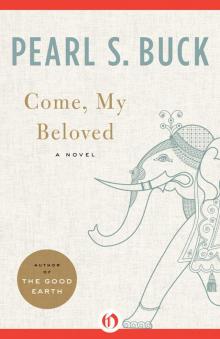 Come, My Beloved
Come, My Beloved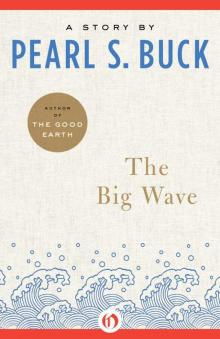 The Big Wave
The Big Wave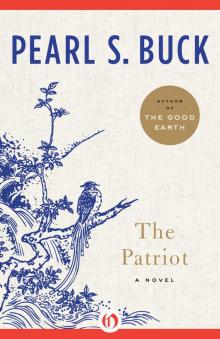 The Patriot
The Patriot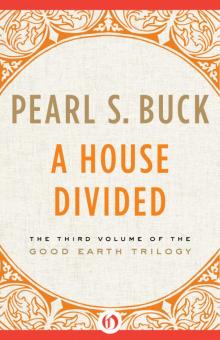 House Divided
House Divided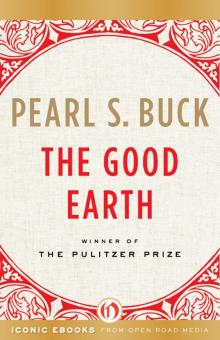 The Good Earth
The Good Earth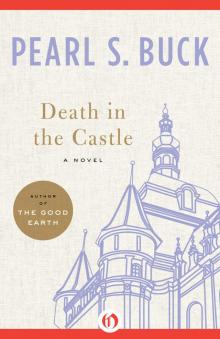 Death in the Castle
Death in the Castle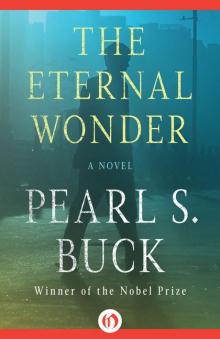 The Eternal Wonder
The Eternal Wonder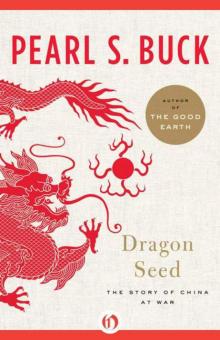 Dragon Seed: The Story of China at War
Dragon Seed: The Story of China at War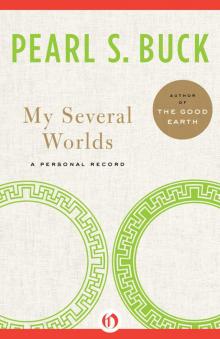 My Several Worlds: A Personal Record
My Several Worlds: A Personal Record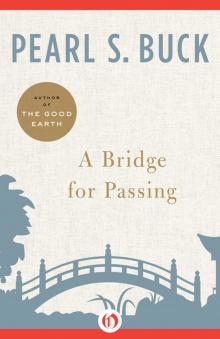 A Bridge for Passing: A Meditation on Love, Loss, and Faith
A Bridge for Passing: A Meditation on Love, Loss, and Faith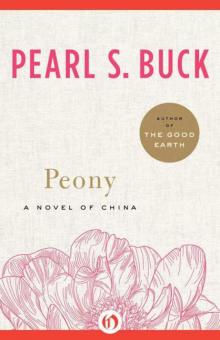 Peony
Peony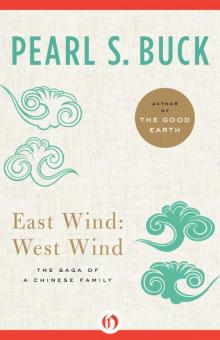 East Wind: West Wind: The Saga of a Chinese Family
East Wind: West Wind: The Saga of a Chinese Family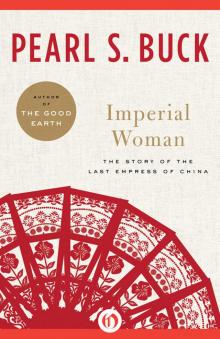 Imperial Woman
Imperial Woman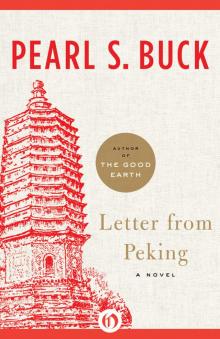 Letters From Peking
Letters From Peking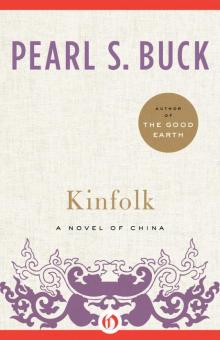 Kinfolk
Kinfolk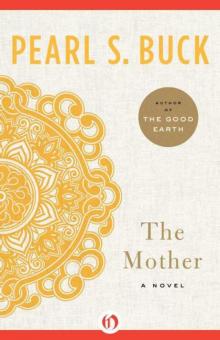 The Mother
The Mother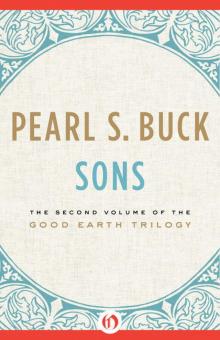 Sons
Sons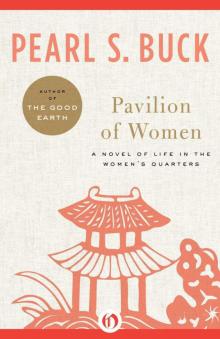 Pavilion of Women
Pavilion of Women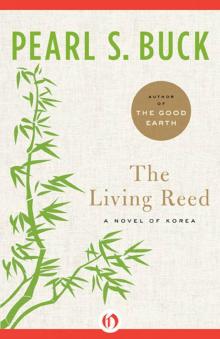 The Living Reed: A Novel of Korea
The Living Reed: A Novel of Korea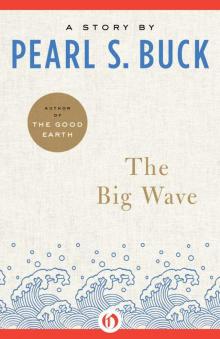 The Big Wave: A Novel
The Big Wave: A Novel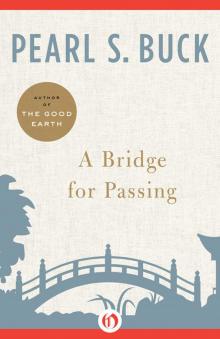 Bridge for Passing
Bridge for Passing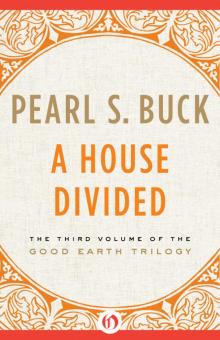 A House Divided
A House Divided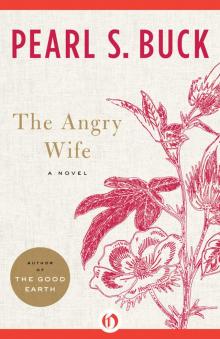 Angry Wife
Angry Wife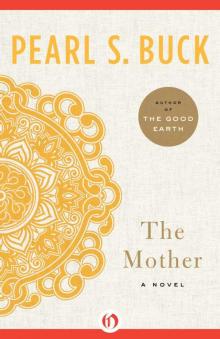 The Mother: A Novel
The Mother: A Novel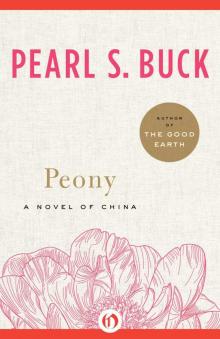 Peony: A Novel of China
Peony: A Novel of China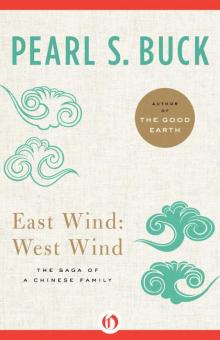 East Wind: West Wind
East Wind: West Wind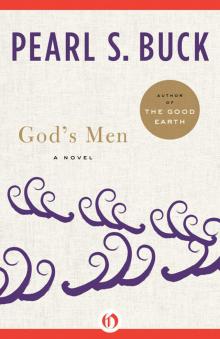 Gods Men
Gods Men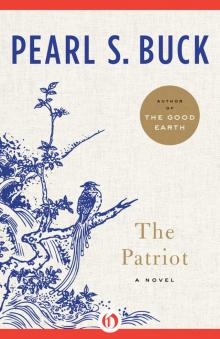 Patriot
Patriot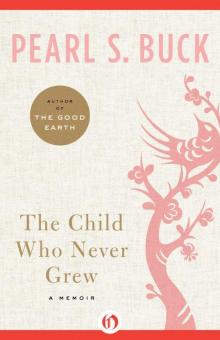 The Child Who Never Grew (nonfiction)
The Child Who Never Grew (nonfiction)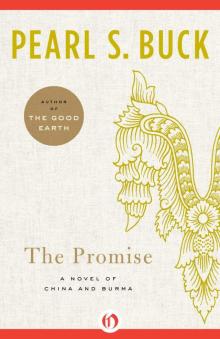 The Promise: A Novel of China and Burma (Oriental Novels of Pearl S. Buck)
The Promise: A Novel of China and Burma (Oriental Novels of Pearl S. Buck)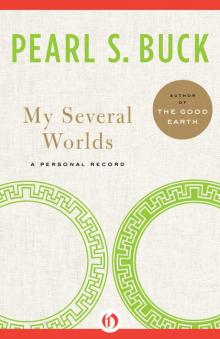 My Several Worlds
My Several Worlds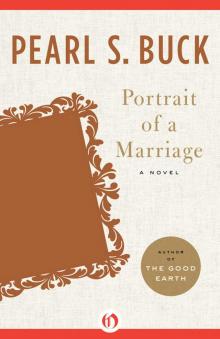 Portrait of a Marriage
Portrait of a Marriage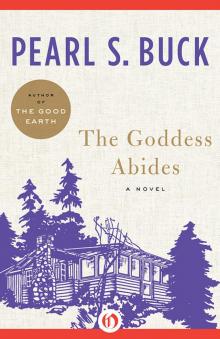 The Goddess Abides: A Novel
The Goddess Abides: A Novel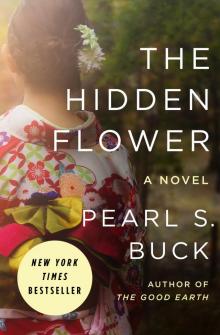 Hidden Flower
Hidden Flower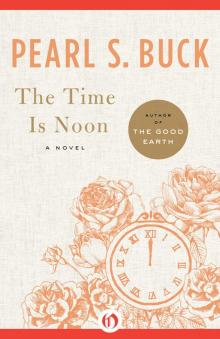 Time Is Noon
Time Is Noon